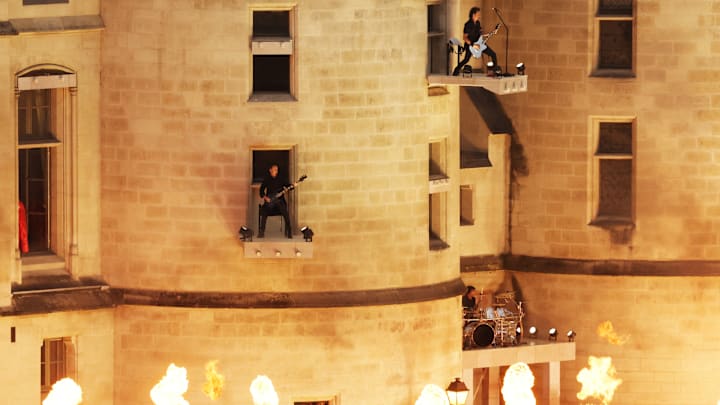French metal band Gojira faced unexpected controversy after their electrifying performance at the 2024 Summer Olympics opening ceremony, with claims circulating that their performance had satanic undertones. However, frontman Joe Duplantier dismissed these allegations. In an interview with Rolling Stone, Duplantier explained that the dramatic performance wasn’t intended to be satanic.
Instead, he emphasized the historical and cultural roots of the set. "It's French history. It's French charm," Duplantier said.
He elaborated on the symbolism of the event, which featured double kick drums, intense pyrotechnics, and blood-red streamers while the band performed the 19th-century French anthem "Ah! Ça Ira" from the windows of Paris’ historic Conciergerie Palace.
According to Duplantier, the spectacle reflected France’s revolutionary spirit, known for "beheaded people, red wine, and blood all over the place," adding that the performance was simply "romantic" in its essence. Still, at a time when America's facing another election, one should expect the occasional moral panic involving bands, as well as cases where the outrage is probably more legitimate.
Gojira at the Olympics?!
Gojira’s involvement in the Olympics was a surprise even to them. Duplantier revealed that when the band first received the call from Olympic Committee composer Victor Le Masne, they thought it was unlikely they'd be included. He described it as "completely unreal" to imagine performing at such a high-profile event.
Despite being known for their strong global presence in metal music, Gojira didn’t consider themselves as big as bands like Metallica or AC/DC, who could have easily been chosen for the honor. Duplantier admitted they never saw themselves as the "biggest band in the world" that would be worthy to play the Olympics. However, he says, "I thought of the whole metal community at that moment," and felt a sense of honor and responsibility to accept.
The eccentricities of the performance
The band didn’t even select the song they performed. In fact, they were largely kept in the dark about their role in the ceremony. They only knew they would be performing alongside major artists like Celine Dion and Lady Gaga but had no clear picture of how their set would fit into the larger event.
Despite the lack of rehearsals and the enormity of the occasion, Gojira stuck to their roots. They didn’t want to water down their style to "shock" people by dramatically changing styles, but instead wanted to represent the metal scene authentically, even at an event not just intended for "Metalheads." An Olympics performance isn't even on most band's bucket lists — even if the band has big aspirations —, but once you get invited, it's understandable to not turn it down.
Why Gojira was chosen...and no, it's not because they, or the Olympics, are "satanic"
Historically, Gojira has always maintained a strong connection to France’s culture and secular values. Duplantier pointed out that France’s principle of laïcité, or the separation of church and state, played a role in their artistic expression. And, to be clear, secularism is not only not satanic, but not anti-religious. In fact, religious people can endorse the concept of secular government, and often do.
Gojira's lead singer reiterated that the performance wasn’t meant to be religious or anti-religious. "There’s nothing satanic," he said with a laugh. He noted that France’s foundation as a republic is built on historical events like the revolution, during which the country severed its official ties with religion.
Article Ten of the 1789 Declaration of the Rights of Man and of the Citizen states: "No one may be disturbed on account of his opinions, even religious ones, as long as the manifestation of such opinions does not interfere with the established Law and Order." This is a critical aspect of French identity, and Duplantier argued that the performance was more about history, spreading knowledge, and cultural symbolism than anything related to religious imagery.
Despite the backlash from certain conservative commentators, including Donald Trump Jr. and Speaker Mike Johnson, who took issue with other elements of the ceremony, Duplantier said he had not seen the entire event. He had been focused on his family and didn't have time to fully absorb the show’s other components, including a supposed recreation of the "Last Supper" featuring drag queens, which had drawn criticism from religious conservatives (though, apparently, the scene was actually intended to be about the Greek God Dionysus).
A big event for a big band
Gojira’s appearance at the Olympics marks another milestone in their career. The band, formed in 1996, has consistently pushed the boundaries of metal, blending environmental activism with their unique sound. Their albums, such as From Mars to Sirius (2005) and Magma (2016), have been critically acclaimed, and have earned them a dedicated fanbase worldwide.
Gojira has become known not just for their heavy sound but also for their thought-provoking lyrics, often touching on themes of nature, spirituality, and humanity's impact on the planet. For example, their song "A Sight To Behold" features the words:
"The way we all behave is not understandable
It is so sad to see the wealth of our planet fade away
We all behave like children, taking off the head of our
Teddy bear to see what's inside, taking, not giving back"
Their Olympics performance is yet more proof of their ability to cross over into mainstream culture while staying true to their roots. Gojira’s blend of intensity and intellect has helped them stand out in the metal world, and their commitment to pushing artistic boundaries has earned them accolades across the globe.
